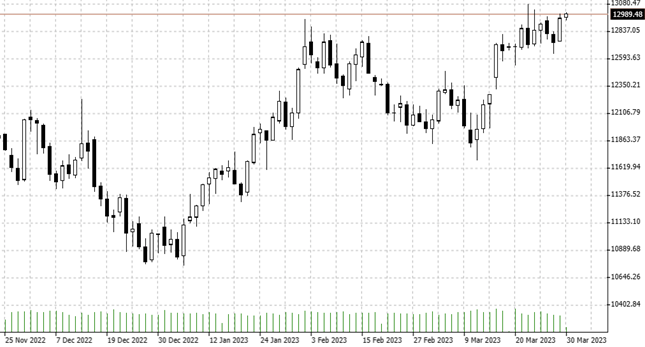

28.03.2023 – Despite the recent banking crisis, the Nasdaq 100 has officially entered a bull market. Surprising, because higher interest rates and possible new problems at more banks could leave many high-tech companies stranded financially.
A closer look reveals the real reasons for the paradox: in the Nasdaq 100, it is mainly the mega-caps that have gained. But never mind. Let’s look at the Nasdaq 100, here the daily chart. Since its December low, the index has risen by 20 per cent, which is precisely the indicator of a bull market. However, Ron Adler, trader at JPMorgan, can imagine a consolidation in the coming days due to profit-taking in the mega-caps, especially Google and Meta.

Source: Bernstein Bank GmbH
But is the banking crisis really over? Who knows. Tony Pasquariello, Head of Hedge Fund Coverage at Goldman Sachs, who had warned of a credit crunch just a few days ago, now noted an interesting change in market sentiment. He commented: “Either the regional banking story subsides and the Fed needs to keep chopping wood, or the regional banking story doesn’t subside and we lurch from issue to issue. Whereby “chopping wood” probably means capping interest rates.
The big ones should pay
Meanwhile, the Federal Deposit Insurance Corp. apparently wants to ask the big banks to pay 23 billion dollars. This is reported by Bloomberg with reference to insiders. After the collapse of the Silicon Valley Bank and the Signature Bank, the fund for account protection in the amount of 128 billion dollars is to be replenished. Many investors now assume that this could mitigate a shakeout at small banks – which would prevent a major panic. In any case, pressure on the FDIC from politicians is growing in this direction.
Powell gives hope
In addition to the banking crisis seemingly abating, there is another factor for optimism in high-tech stocks, which are particularly sensitive to interest rates. Apparently, hopes are rising for an end to interest rate hikes. For example, Jerome Powell, head of the Federal Reserve, had said in a private meeting with Republicans from the House of Representatives that inflation in the supply chain is largely contained. This is also reported by the news agency Bloomberg, citing Congressman Kevin Hern.
Our conclusion: we are sceptical that the market shakeout is over for banks and for many start-ups. However, should the Federal Reserve officially signal the end of tightening or even cut rates again, the case for the bulls outweighs the case for the shorts. Whether long or short – Bernstein Bank wishes you successful trades and investments!
______________________________________________________________________________________________________________
The content of this publication is for general information purposes only. In this context, it is neither an individual investment recommendation or advice nor an offer to purchase or sell securities or other financial products. The content in question and all the information contained therein do not in any way replace individual investor- or investment-oriented advice. No reliable forecast or indication for the future is possible with respect to any presentation or information on the present or past performance of the relevant underlying assets. All information and data presented in this publication are based on reliable sources. However, Bernstein Bank does not guarantee that the information and data contained in this publication is up-to-date, correct and complete. Securities traded on the financial markets are subject to price fluctuations. A contract for difference (CFD) is also a financial instrument with leverage effect. Against this backdrop, CFD trading involves a high risk up to the point of total loss and may not be suitable for all investors. Therefore, make sure that you have fully understood all the correlating risks. If necessary, ask for independent advice. CFDs are complex instruments and are associated with the high risk of losing money quickly because of the leverage effect. 68% of retail investor accounts lose money trading CFD with this provider. You should consider whether you understand how CFD work and whether you can afford to take the high risk of losing your money.7
